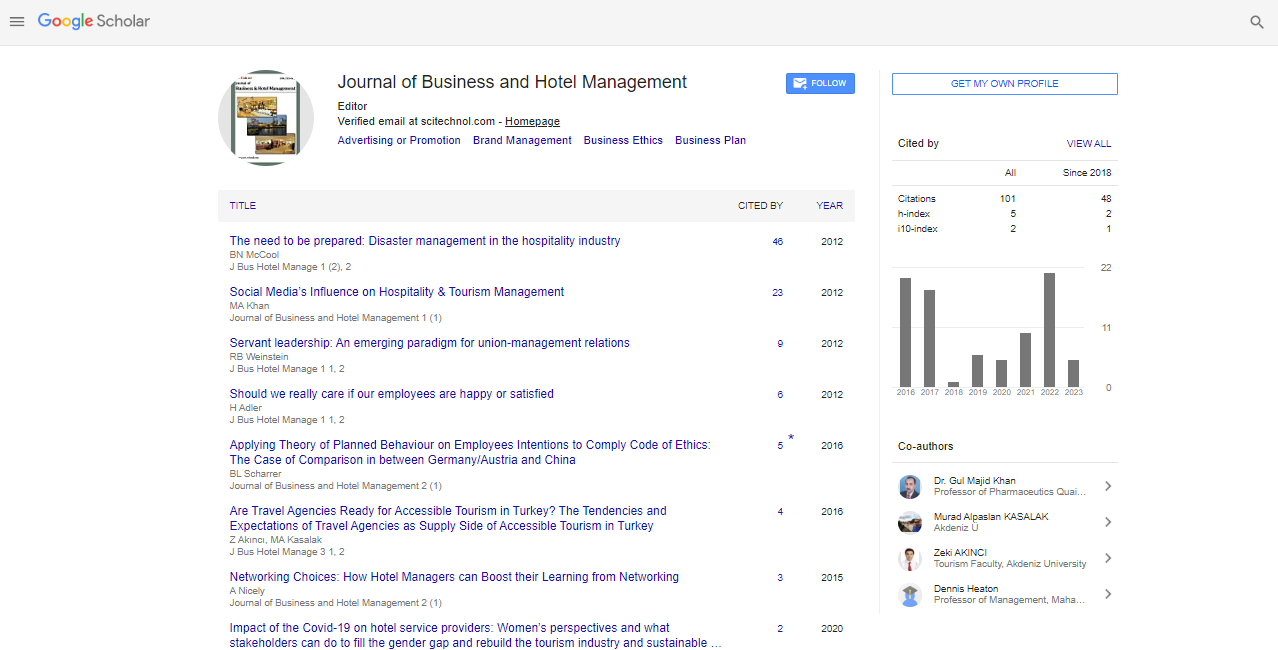Perspective, J Bhm Vol: 9 Issue: 1
Niche Marketing in the Hotel Business
Weber Odlin*
Department of Management and International Business, University of Auckland, Auckland, New Zealand
*Corresponding Author: Weber Odlin
Department of Management and
International Business, University of Auckland, Auckland, New Zealand
E-mail: odliweb@auckland.ac.nz
Received date: 03 February, 2023, Manuscript No. JBHM-23-93141;
Editor assigned date: 07 February, 2023, PreQC No. JBHM-23-93141 (PQ);
Reviewed date: 21 February, 2023, QC No. JBHM-23-93141;
Revised date: 28 February, 2023, Manuscript No. JBHM-23-93141 (R);
Published date: 07 March, 2023, DOI: 10.4172/2324-9129.9.1.128
Citation: Odlin W (2023) Niche Marketing in the Hotel Business. J BHM 9:1.
Description
A niche market refers to a segment of a larger market with specific needs, preferences, or characteristics that are not being adequately served by existing products or services.
Where, Niche marketing can be a powerful strategy for businesses, as it allows them to focus their resources on a smaller, more targeted audience, and create a loyal customer base.
Steps to Focus on Niche Markets
Focusing on niche markets can be a smart strategy for providing value in the hotel business. By identifying and catering to specific groups of customers, the hotel can be differentiated from competitors and build a loyal customer base.
Here are some steps to help you focus on niche markets:
Identify your niche
Conduct market research to identify niche markets that are currently underserved or overlooked by other hotels in the local. For example, a person might target business travelers, families with young children, or adventure travelers.
Develop a unique value proposition
Once the niche is identified, develop a value proposition that speaks directly to their needs and desires. For example, if a person is targeting adventur e travelers, we might offer guided hikes or bike rentals.
Create tailored marketing campaigns
Once we have the value proposition in place, introduce targeted marketing campaigns that speak directly to the niche audience. Use social media, email marketing, and other channels to reach out the target market and showcase what we have to offer.
Provide exceptional customer service
To build loyalty among the niche audience, we need to provide exceptional customer service. We must make sure that staff gets trained to understand the unique needs and preferences of a niche market and go above and beyond to exceed their expectations. By focusing on niche markets, we can create a competitive advantage for the hotel and build a loyal customer base that will keep coming back.
Common Ways to Define a Niche
There are several common ways to define a niche, depending on the context and industry.
Here are some of the most common ways:
Demographics
This involves segmenting a market based on demographic factors such as age, gender, income, education, or occupation. For example, a hotel might focus on serving business travelers, families with young children, or retirees.
Geography
This involves targeting a specific geographic area, such as a city, region, or country. For example, a hotel might focus on serving tourists visiting a specific city or region.
Psychographics
This involves segmenting a market based on psychological factors such as personality, values, attitudes, and lifestyle. For example, a hotel might target health and wellness enthusiasts or luxury travelers.
Behavior
This involves targeting customers based on their behavior, such as their buying habits, brand loyalty, or specific needs. For example, a hotel might target customers who frequently travel for work and need a convenient location and business services.
Product or service
This involves specializing in a specific product or service. For example, a hotel might specialize in luxury accommodations, ecofriendly practices, or pet-friendly amenities.
Price
This involves targeting customers based on their willingness to pay a certain price. For example, a hotel might focus on serving budgetconscious travelers or high-end luxury customers.
Conclusion
Defining a niche is a crucial step in developing a successful business strategy, as it allows a company to differentiate itself from its competitors and better serve the needs of its target customers.
 Spanish
Spanish  Chinese
Chinese  Russian
Russian  German
German  French
French  Japanese
Japanese  Portuguese
Portuguese  Hindi
Hindi 